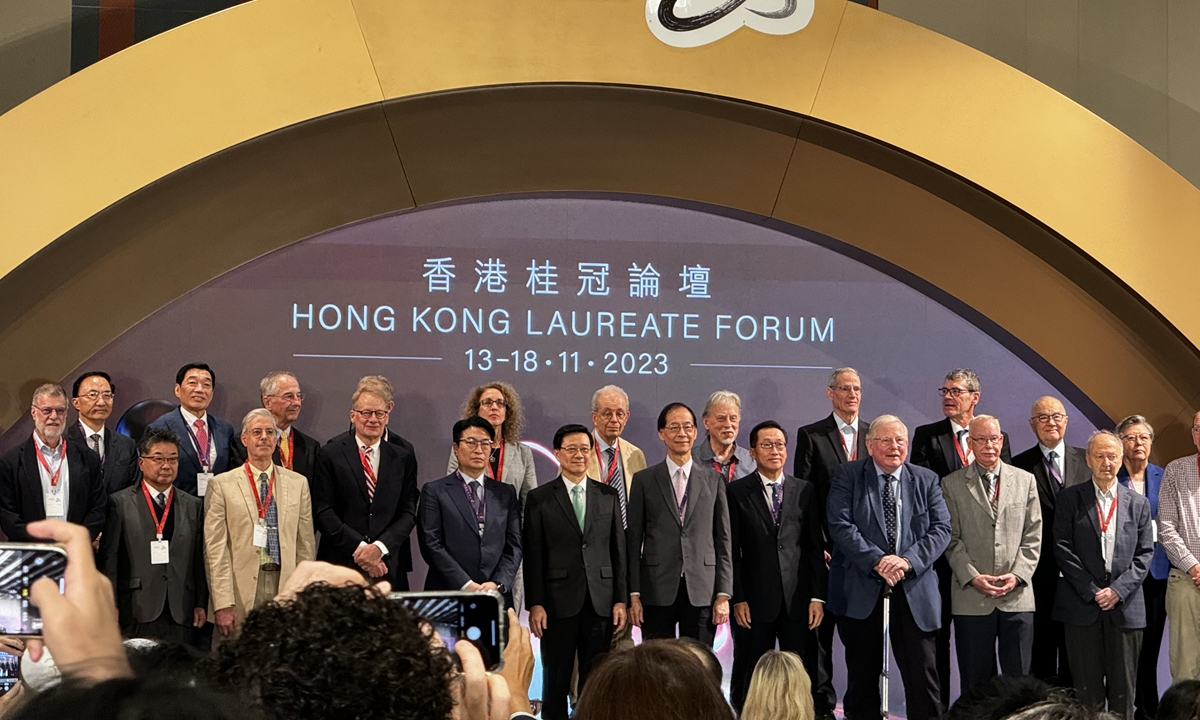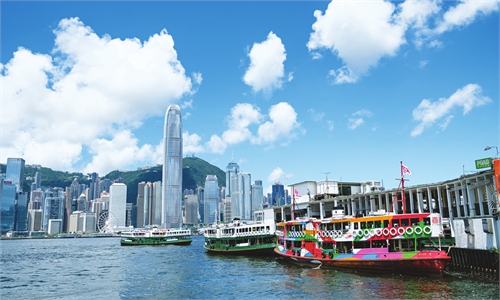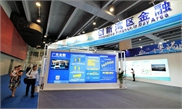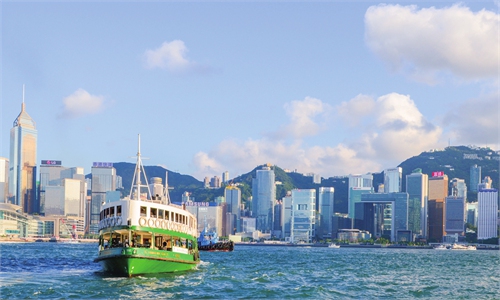
Hong Kong Laureate Forum kicks off with more than 200 scientists from different countries in Hong Kong on November 13, 2023. Photo: Liu Caiyu/GT
A world-class forum that has invited more than 200 scientists from different countries officially kicked off in Hong Kong on Monday, contributing to the city's endeavors to become an international innovation and technology center.
Hong Kong is determined to develop into an international innovation and technology center and will allocate more targeted resources to boost the city's innovation and technology ecosystems, said Chief Executive of the Hong Kong Special Administrative Region (HKSAR) John Lee at the opening ceremony of the Hong Kong Laureate Forum.
At the forum, Lee sent a clear message that Hong Kong is sparing no effort or resources to boost innovation and technology, and promises more targeted measures will be introduced so as to further enhance the city's ecosystem in innovation and technology.
Lee mentioned how the SAR government has endeavored to enlarge the talent pool in innovation and technology by nurturing, attracting and retaining talents, while also successfully securing 30 key enterprises' expansion or establishment in Hong Kong over the past year as a key driver of the economy.
"This development is set to revolutionize our industry structure and firmly establish innovation and technology as a key driver of the economy. This, in turn, will form a sustainable science and innovation ecosystem for our next generation," Lee told the Forum.
The Forum, which was postponed for two years due to the pandemic, is being held at the Hong Kong Science Park from November 13-18. Renowned Shaw Prize and Nobel winners in the fields of astronomy, life science and medicine, and mathematical sciences are in attendance.
The Shaw Prize, also known as the "Nobel of the East," was founded back in 2002. The prize was established by Run Run Shaw with the aim of honoring exceptional scientists.
Timothy Tong Wai-cheung, chairman of the Hong Kong Laureate Forum and former president of Hong Kong Polytechnic University, told the Global Times that the Forum is not a replica of the World Laureates Forum held in Shanghai or other academic forums. Its ultimate goal is to create an atmosphere in Hong Kong that sparks young people's interest in studying science and encourages them to pursue science as a future career.
Tong emphasized that not only students, but also budding scientists and professionals who have recently obtained their PhDs and are beginning to engage in research, will have the opportunity to interact with top scientists present at the meeting. During the breakout sessions, Global Times reporters observed young scientists actively sharing their ideas with the laureates and eagerly seeking suggestions and recommendations from these world talents.
Despite being a small city, Hong Kong has five universities that are globally recognized, making it an attractive destination for international talents to share their scientific endeavors and experiences in the city, Tong noted.
Gero Miesenbock, a Shaw Laureate in Life Science and Medicine 2020 and also a professor of physiology and director of the Centre for Neural Circuits and Behavior, University of Oxford, told the Global Times that, based on his own observation and contacts with Hong Kong universities and students, Hong Kong is on a good track for nurturing young scientists.
Throughout the duration of the six-day event, attendees will have the opportunity to engage in seminars, discussions, and visits to science facilities and universities. Additionally, some of the Shaw laureates will interact with middle school students from the local area with the aim of igniting their interest in science.
During his address, the chief executive told the Forum that Hong Kong is bestowed with the unparalleled advantage of having the strong support of national strategies and global connectivity. With the support of the National 14th Five-Year Plan, Hong Kong is determined to develop into an international innovation and technology center.
Lee said the development of the Guangdong-Hong Kong-Macao Greater Bay Area (GBA) will bring Hong Kong immense opportunities to generate innovation and technology.
To boost the innovation and technology sector, Lee highlighted several key areas, including advancing new industrialization and AI development, promoting cross-boundary data flow, digitizing government services, providing new land supply for innovation and technology use, and developing the Hetao Shenzhen-Hong Kong Science and Technology Innovation Co-operation Zone with the Chinese mainland.




